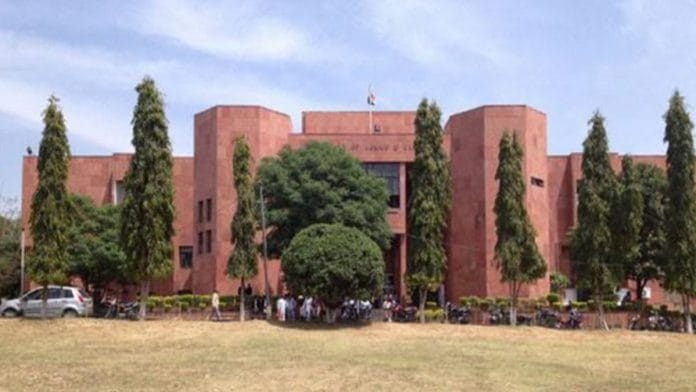New Delhi: Justice Atul Sreedharan of the Jammu and Kashmir High Court spoke out of his “experience” to highlight the “stock” and “copy-paste” arguments by the prosecution to oppose bail of those arrested under the Unlawful Activities (Prevention) Act (UAPA).
These stock arguments often include expressions such as “offence is heinous”; “against the interest of nation”; “accused may influence witnesses”; “accused release would be counterproductive for unity and integrity of India”; “national security”; “allegiance to Pakistan”; “secession of Jammu and Kashmir from India and its accession to Pakistan”.
The main thrust of the arguments is usually on these aspects and are made without any supportive material against the accused, the judge said, adding that, such arguments psychologically overawe the court, which acknowledges them as relevant elements in UAPA while making a decision.
Justice Sreedharan, who was part of a division bench comprising Justice Mohammad Yousuf Wani, made the critical remarks in its 19 April order granting bail to Khursheed Ahmad Lone against whom the J&K Police registered an FIR under UAPA in 2013.
Though Justice Wani agreed with Justice Sreedharan’s view to release Lone on bail, he did not support his senior’s observations on the “stock” and “copy-paste” arguments by the prosecution.
Arrested on 10 April, 2013, on terror charges, Lone was detained under the Public Safety Act, 1978. In October 2013, the J&K HC quashed his detention, and notwithstanding that he was still under arrest in the UAPA FIR, the police released him on a personal bond.
The police took the decision even though the law designates a special court to grant bail to UAPA accused after observing that a prima facie case is not made out against the person.
After remaining free for nine years, Lone was taken back into custody in October 2022, when the J&K Police filed a chargesheet in the case against him.
Lone, along with a co-accused, was charged with collecting money from the people and influencing youngsters to “wage war against the Union of India.” He moved the HC in September 2023 for bail on merits and medical grounds after the trial court declined to release him.
‘Sure shot recipe for miscarriage of justice’
In the high court, the counsel appearing for the Union Territory of J&K referred to the disclosure statement of the co-accused to build a case against Lone. It was also argued that, since the trial court had framed charges against Lone, the only presumption drawn was that there was a prima facie case against him.
Despite ample opportunity from the court, the police counsel could not place an independent witness’s statement or material evidence to prima facie show Lone’s involvement in the case.
“The learned counsel for the Union Territory has had more than an hour’s time to peruse the chargesheet, to pore over the statement of witnesses, but no such material has been forthcoming and so none has been placed before us,” the bench noted.
To the lawyer’s argument on national security and that Lone’s release would be counterproductive for the unity and integrity of India, the bench said: “These arguments are copy-pasted in every case under the UAPA. In fact, experience has shown that the main thrust of the prosecution’s arguments is usually on these aspects, rather than the specific material, which appears, against an accused person.”
Noting that such arguments can “psychologically overawe” the court, Justice Sreedharan said: “But to be influenced by the often forceful submission of internal security of the state, and to reject a bail application where the state has utterly failed to disclose any material against the accused, which could raise a prima facie view of the involvement of the accused as charged by the state, is a sure shot recipe for miscarriage of justice.”
He added that the question of internal security may be real, or bogie, by which the state attempts to sway the court’s perception.
“…by impressing upon the court on aspects of internal/national security, and thereby try to get the court to dismiss the application for bail by contending that the imperatives of internal security demand that the accused remain incarcerated even in the absence of judicially cognisable material only because there is suspicion that the accused may be involved in the offence as charged,” the judge said.
The court rejected the argument that it could not decide on Lone’s bail application because a trial court had already framed charges against him.
Drawing a distinction between the legislative intent of the two stages — grant of bail and framing of charge — the HC said that, at the stage of framing charge, even “strong suspicion” may be construed as prima facie evidence. However, for bail, in addition to the existence of a prima facie case, the case against an accused must pass the test of “clear and present danger,” it added.
Apart from considering medical grounds, the HC granted bail to Lone, acknowledging that he had been free for nine years following his release by the police. It said that if Lone wanted to influence witnesses, that was the best time to do so when the case was under investigation for nine years and he was a free man.
“However, there is no allegation by the counsel of Union Territory of Jammu and Kashmir that, during the period he was free, he had tried to win over the witnesses. Unfortunately, the learned court below has also not given a finding on such compelling circumstances, which mandate the arrest of the appellant, even though he was a free man for nine years,” the HC said while directing Lone’s release.
(Edited by Richa Mishra)






